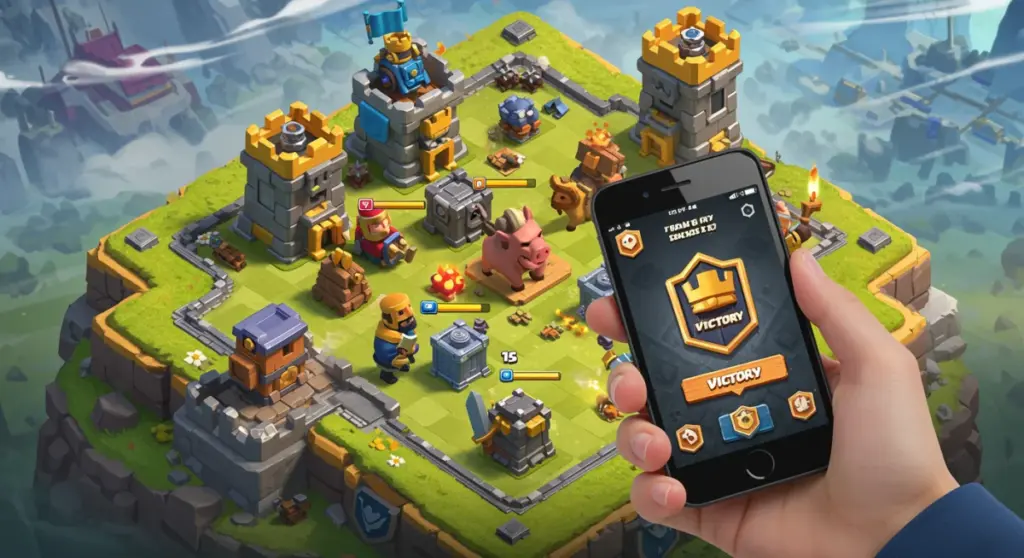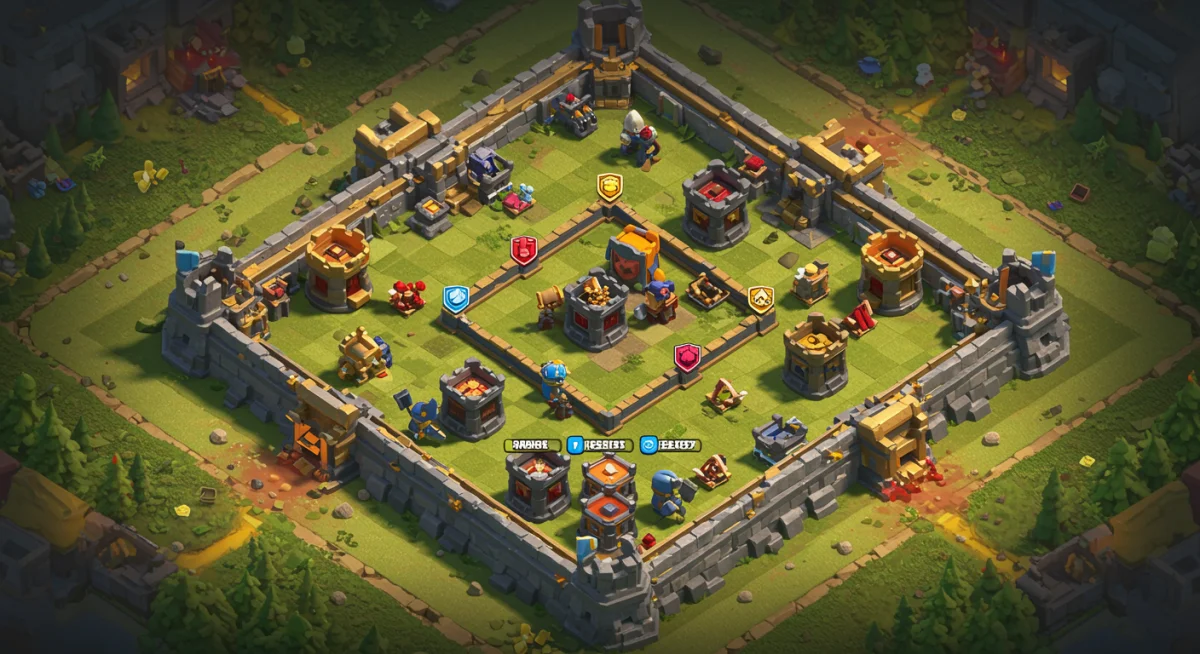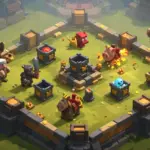Clash Royale Grand Challenge: Achieve 70% Win Rate

Anúncios
Achieving a 70% win rate in Clash Royale Grand Challenges requires a deep understanding of meta decks, effective counterplay, and precise execution, transforming casual play into consistent competitive success.
Are you ready to elevate your Clash Royale gameplay and consistently dominate Grand Challenges? Mastering Clash Royale Grand Challenge Strategies is not just about having powerful cards; it’s about intelligent deck construction, precise execution, and an in-depth understanding of your opponents’ likely moves. This guide will equip you with the knowledge to push your win rate to an impressive 70% and beyond.
Understanding the Grand Challenge Ecosystem
The Grand Challenge in Clash Royale is a demanding environment where only the most skilled players thrive. Unlike standard ladder play, challenges offer a level playing field, with all cards capped at level 11. This means success hinges entirely on strategic prowess, deck synergy, and tactical decision-making, rather than card levels. To truly excel, you must first grasp the unique dynamics of this competitive arena.
Analyzing the current meta is paramount. The Clash Royale meta continuously shifts, with new cards, balance changes, and player innovations influencing popular deck archetypes. Staying informed about which decks are performing well allows you to both adapt your own strategy and anticipate what your opponents might play. This proactive approach is a cornerstone of achieving a high win rate.
The Meta’s Influence on Strategy
The meta dictates which cards are strong and which are weak. Ignoring it would be a critical mistake. For instance, if aggressive cycle decks are prevalent, you might want to include more defensive or splash damage units in your deck. Conversely, if slow, heavy beatdown decks are popular, having strong building targeting units or high damage per second (DPS) cards becomes crucial.
- Stay Updated: Regularly check community sites and pro player streams for meta updates.
- Identify Trends: Recognize common card combinations and win conditions.
- Counter-Meta: Build decks that specifically target weaknesses of top-tier meta decks.
Understanding the Grand Challenge ecosystem means recognizing that every match is a strategic puzzle. Your opponents are often experienced players, so relying on simple tactics won’t suffice. Develop a flexible mindset, ready to adjust your game plan based on the cards revealed by your adversary.
Building a Winning Deck: Synergy and Balance
A successful Grand Challenge run starts long before the first card is played – it begins with intelligent deck building. Your deck needs to be more than just a collection of powerful cards; it must be a cohesive unit with strong synergy and a balanced elixir cost. This foundation is critical for any aspiring 70% win rate player.
The core principle of deck building for Grand Challenges is versatility. Your deck should have answers for a wide range of threats and win conditions. Relying too heavily on a single strategy makes you vulnerable to specific counter-decks. A well-rounded deck will include a primary win condition, defensive options, spell support, and cycle cards.
Key Components of a Balanced Deck
Every card slot in your eight-card deck serves a purpose. Neglecting any of these roles can leave critical gaps in your strategy. Consider how each card interacts with others and contributes to both offense and defense.
- Win Condition: A primary card or combination designed to deal damage to enemy towers (e.g., Hog Rider, Golem, Royal Giant).
- Support Troops: Units that protect your win condition or deal with enemy defenses (e.g., Electro Wizard, Mega Minion).
- Defensive Cards: Cards used to stop opponent pushes (e.g., Valkyrie, Inferno Tower, Mini P.E.K.K.A.).
- Spells: Essential for direct tower damage, troop removal, or support (e.g., Fireball, Zap, Poison).
- Cycle Cards: Low-elixir cards to quickly rotate through your deck (e.g., Skeletons, Ice Spirit, Goblins).
Elixir cost management is another vital aspect. A deck with too high an average elixir cost will be slow and vulnerable to fast cycle decks, while a deck that’s too cheap might lack the firepower for strong pushes. Aim for an average elixir cost between 3.0 and 4.0, depending on your deck’s archetype. Test your deck extensively in friendly battles or classic challenges to fine-tune its balance and identify any weaknesses before entering a Grand Challenge.

Mastering Elixir Management and Cycle Play
Elixir management is arguably the most critical skill in Clash Royale, especially in Grand Challenges. Every drop of elixir represents potential power, and efficiently utilizing it can create overwhelming advantages. Understanding when to spend elixir, when to save it, and how to manipulate your card cycle will significantly impact your win rate. This goes beyond simply not over-committing; it involves a deep awareness of both your and your opponent’s elixir generation.
Cycle play refers to the process of strategically playing low-cost cards to get back to your key offensive or defensive cards faster. A well-cycled deck can repeatedly deploy its win condition or keep strong defensive responses in hand, dictating the pace of the match. Neglecting cycle mechanics can lead to awkward hands and missed opportunities.
The Art of Elixir Advantage
Gaining an elixir advantage means making trades where your cards cost less elixir than the cards your opponent used to counter them. For example, using a 3-elixir Knight to fully stop a 5-elixir Wizard creates a 2-elixir advantage. These small advantages accumulate over time, allowing you to build larger, more threatening pushes or maintain a stronger defense.
- Positive Elixir Trades: Always look for opportunities to counter-attack with less elixir.
- Punish Over-Commitment: If an opponent overspends on one lane, launch a strong push on the other.
- Elixir Counting: Try to estimate your opponent’s elixir, especially after a large push, to know when they are vulnerable.
Effective cycle play also involves knowing when to passively cycle cards at the back of your arena to bring desired cards into your hand without giving your opponent an elixir advantage. This is particularly important for decks that rely on specific card combinations for their win condition. By mastering elixir management and cycle play, you gain a profound tactical edge, allowing you to control the flow of the battle and consistently outmaneuver your adversaries.
Defensive Principles and Counter-Pushing
While offensive prowess is exciting, a solid defense is the backbone of any high-win-rate strategy in Clash Royale Grand Challenges. Knowing how to efficiently defend against various pushes, minimize tower damage, and transition into a powerful counter-attack is fundamental. A strong defense not only saves your towers but also sets up your own winning opportunities by creating elixir advantages.
Effective defense involves understanding troop interactions, optimal placement, and timing. Every defensive card has specific strengths and weaknesses. For instance, a Valkyrie excels against swarms, while an Inferno Tower melts high-HP tanks. Using the right card at the right time in the right position can turn a seemingly overwhelming assault into a manageable threat.
Turning Defense into Offense
The concept of the counter-push is vital. Instead of just defending and letting your troops die, aim to have your surviving defensive units transition into an offensive push. For example, if your Mini P.E.K.K.A. successfully defends a Hog Rider, support it with a ranged unit or a small spell as it crosses the bridge to create a new threat. This maximizes the value of your elixir spent on defense.
- Optimal Card Placement: Use your tower’s protection and pull enemy troops to the middle.
- Stacking Support: Place ranged units behind tanks or splash units behind single-target attackers.
- Anticipate Spells: Don’t clump all your defensive troops together if your opponent has a Fireball or Poison.
Learning to defend effectively often requires practice and understanding common attack patterns. Pay attention to how opponents typically initiate pushes and what cards they use to support their win condition. By understanding these patterns, you can pre-plan your defensive responses, making your defenses more robust and your counter-pushes more potent. This defensive mastery is a key component to achieving and maintaining a 70% win rate.

Advanced Tactics: Prediction and Psychological Warfare
Beyond the fundamental strategies of deck building and elixir management, advanced tactics like prediction and psychological warfare separate good players from great ones in Clash Royale Grand Challenge Strategies. These subtle yet powerful techniques allow you to outmaneuver opponents, create unexpected advantages, and often win games that seem unwinnable. They require a deep understanding of the game and keen observation skills.
Prediction involves anticipating your opponent’s next move and playing a card to counter it before they even deploy it. This can be incredibly rewarding, leading to massive elixir advantages and devastating pushes. For example, if your opponent consistently places a specific troop to counter your Hog Rider, you might pre-place a Fireball or Log to hit both their counter and their tower.
Reading Your Opponent
Psychological warfare in Clash Royale isn’t about taunting (though a well-timed emote can sometimes work); it’s about influencing your opponent’s decisions through your plays. This could involve baiting out specific counter cards, making them over-commit, or lulling them into a false sense of security. Observing their reactions to your pushes and defenses can reveal patterns and weaknesses you can exploit.
- Baiting Spells: Use cheaper cards to draw out expensive spells, then deploy your main threat.
- Pre-placing Counters: Anticipate common defensive placements and hit them with a spell.
- Aggressive Openings: Sometimes an early aggressive push can force an opponent to play defensively for the rest of the match.
Mastering prediction requires pattern recognition. Pay attention to how your opponent reacts to certain cards or pushes. Do they always play a specific spell after you drop a certain troop? Do they defend the same way every time? Identifying these habits allows you to predict their actions and capitalize on them. Incorporating these advanced tactics will significantly boost your Grand Challenge performance, giving you the edge needed for a 70% win rate.
Adapting to Opponents and Mid-Game Adjustments
No two Grand Challenge matches are identical, and rigid adherence to a single game plan can be detrimental. The ability to quickly assess your opponent’s deck and playstyle, and then make effective mid-game adjustments, is a hallmark of high-level play. This adaptability ensures you’re always playing optimally, even when faced with unexpected deck archetypes or aggressive strategies.
The first 30-60 seconds of a match are crucial for reconnaissance. Observe which cards your opponent plays and try to identify their likely win condition and defensive answers. Do they have a strong tank? Are they running a bait deck? Do they rely on spell cycle? Once you’ve identified their strategy, you can begin to tailor your own approach to exploit their weaknesses and protect your own.
In-Game Strategy Shifts
Mid-game adjustments aren’t just about changing your offensive targets; they can involve altering your defensive placements, holding onto specific counter cards, or even switching lanes entirely. For example, if your opponent is heavily defending one lane, a well-timed push on the opposite lane can force them to split their elixir and resources, creating an opening.
- Identify Win Conditions: Pinpoint your opponent’s primary way of damaging your towers.
- Adapt Defense: Adjust your defensive cards and placements based on their main threats.
- Exploit Weaknesses: If they lack splash, use swarms. If they lack air defense, use air troops.
Sometimes, adapting means playing a more passive game, focusing on elixir trades and defense until double elixir, when your deck’s full potential can be unleashed. Other times, it means being more aggressive early on to punish a slow-starting deck. This dynamic approach, characterized by constant evaluation and quick strategic shifts, is indispensable for consistently winning Grand Challenges and maintaining that target 70% success rate.
| Key Strategy | Brief Description |
|---|---|
| Meta Awareness | Stay updated on top-performing decks and card trends to build counter-strategies. |
| Deck Synergy | Construct balanced decks with clear win conditions, defensive options, and spell support. |
| Elixir Management | Master positive elixir trades and efficient card cycling to gain in-game advantages. |
| Adaptive Play | Adjust strategies mid-game based on opponent’s deck and playstyle for optimal responses. |
Frequently Asked Questions About Grand Challenges
The most crucial factor for success is strong fundamental gameplay, encompassing deck synergy, elixir management, and adaptive defensive strategies. While meta knowledge helps, flawless execution of your chosen deck is paramount.
To counter meta decks, identify their primary win condition and build your deck to specifically shut it down. For example, include Inferno Tower for Golem, or Log/Zap for bait decks. Practice these matchups to refine your timing.
The best approach is adaptive. Start defensively to scout your opponent’s deck, then transition to aggressive pushes when you identify an elixir advantage or a weakness. Rarely is a purely aggressive or defensive strategy optimal throughout.
Common mistakes include over-committing elixir, ignoring the card cycle, not adapting to opponent’s deck, and panicking under pressure. Poor defensive placements and predictable plays also frequently lead to losses.
Improving prediction skills comes from extensive practice and observation. Pay attention to opponent’s card rotation and common responses to your pushes. Watch pro players to see how they anticipate and react to plays.
Conclusion
Achieving a 70% win rate in Clash Royale Grand Challenges is an ambitious yet attainable goal for dedicated players. It demands more than just casual play; it requires a deep commitment to understanding game mechanics, mastering deck building, and constantly refining your in-game decision-making. By meticulously studying the meta, constructing synergistic decks, meticulously managing elixir, and executing flawless defensive transitions into counter-pushes, you lay the groundwork for consistent victories. Furthermore, integrating advanced tactics like prediction and maintaining adaptability throughout each match will provide the critical edge needed to outsmart even the most seasoned opponents. Remember, every match is a learning opportunity. Analyze your replays, identify areas for improvement, and continue to practice. With perseverance and the strategies outlined here, you are well on your way to becoming a Grand Challenge master and securing that impressive 70% win rate, demonstrating true expertise in the arena.





